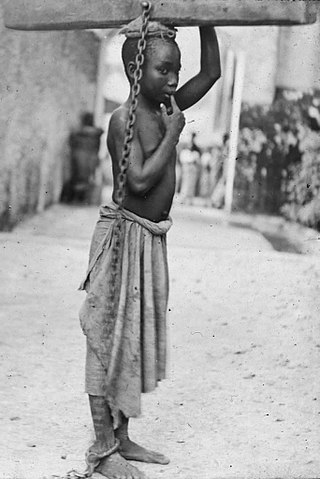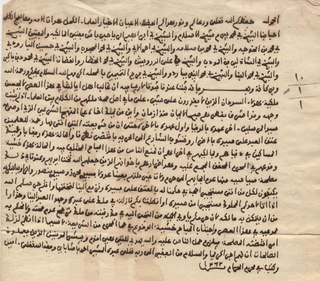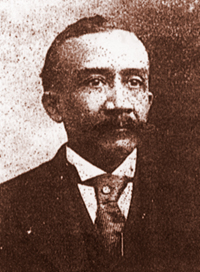
Abolitionism, or the abolitionist movement, is the movement to end slavery and liberate enslaved people around the world.

The Danish West Indies or Danish Virgin Islands or Danish Antilles were a Danish colony in the Caribbean, consisting of the islands of Saint Thomas with 32 square miles (83 km2); Saint John with 19 square miles (49 km2); and Saint Croix with 84 square miles (220 km2). The islands have belonged to the United States as the Virgin Islands since they were purchased in 1917. Water Island was part of the Danish West Indies until 1905, when the Danish state sold it to the East Asiatic Company, a private shipping company.

Emancipation Day is observed in many former European colonies in the Caribbean and areas of the United States on various dates to commemorate the emancipation of slaves of African descent.

Slavery in the Spanish American colonies was an economic and social institution which existed throughout the Spanish Empire including Spain itself. Indigenous peoples were enslaved and their populations decimated. Subsequently enslaved Africans were brought over. Native people were also subjected to forced conversions and conscription.

Afro-Guyanese are generally descended from the enslaved people brought to Guyana from the coast of West Africa to work on sugar plantations during the era of the Atlantic slave trade. Coming from a wide array of backgrounds and enduring conditions that severely constrained their ability to preserve their respective cultural traditions contributed to the adoption of Christianity and the values of British colonists.

Compensated emancipation was a method of ending slavery, under which the enslaved person's owner received compensation from the government in exchange for manumitting the slave. This could be monetary, and it could allow the owner to retain the slave for a period of labor as an indentured servant. Cash compensation rarely was equal to the slave's market value.
The Partido Independiente de Color (PIC) was a Cuban political party composed almost entirely of African former slaves. It was founded in 1908 by African veterans of the Cuban War of Independence. In 1912, the PIC led a revolt in the eastern province of Oriente. The revolt was crushed and the party disbanded. It is believed Esteban Montejo, subject of Miguel Barnets "Biografía de un cimarrón," was a member of this party, or had close associates who were.

Gwendolyn Midlo Hall was an American historian who focused on the history of slavery in the Caribbean, Latin America, Louisiana, Africa, and the African Diaspora in the Americas. Discovering extensive French and Spanish colonial documents related to the slave trade in Louisiana, she wrote Africans in Colonial Louisiana: The Development of Afro-Creole Culture in the Eighteenth Century (1992), studied the ethnic origins of enslaved Africans brought to Louisiana, as well as the process of creolization, which created new cultures. She changed the way in which several related disciplines are researched and taught, adding to scholarly understanding of the diverse origins of cultures throughout the Americas.
Racism in Cuba refers to racial discrimination in Cuba. In Cuba, dark skinned Afro-Cubans are the only group on the island referred to as black while lighter skinned, mixed race, Afro-Cuban mulattos are often not characterized as fully black or fully white. Race conceptions in Cuba are unique because of its long history of racial mixing and appeals to a "raceless" society. The Cuban census reports that 65% of the population is white while foreign figures report an estimate of the number of whites at anywhere from 40 to 45 percent. This is likely due to the self-identifying mulattos who are sometimes designated officially as white. A common myth in Cuba is that every Cuban has at least some African ancestry, influenced by historical mestizaje nationalism. Given the high number of immigrants from Europe in the 20th century, this is far from true. Several pivotal events have impacted race relations on the island. Using the historic race-blind nationalism first established around the time of independence, Cuba has navigated the abolition of slavery, the suppression of black clubs and political parties, the revolution and its aftermath, and the special period.
The history of Afro-Brazilian people spans over five centuries of racial interaction between Africans imported, involved or descended from the effects of the Atlantic slave trade.

The Slave Route Project is a UNESCO initiative that was officially launched in 1994 in Ouidah, Benin. It is rooted in the mandate of the organization, which believes that ignorance or concealment of major historical events constitutes an obstacle to mutual understanding, reconciliation and cooperation among peoples. The project breaks the silence surrounding the slave trade and slavery that has affected all continents and caused great upheavals that have shaped our modern societies. In studying the causes, the modalities and the consequences of slavery and the slave trade, the project seeks to enhance the understanding of diverse histories and heritages stemming from this global tragedy.
For a history of Afro-Caribbean people in the UK, see British African Caribbean community.

Slavery in Cuba was a portion of the larger Atlantic Slave Trade that primarily supported Spanish plantation owners engaged in the sugarcane trade. It was practised on the island of Cuba from the 16th century until it was abolished by Spanish royal decree on October 7, 1886.

Slavery in Tunisia was a specific manifestation of the Arab slave trade, which was abolished on 23 January 1846 by Ahmed I Bey. Tunisia was in a similar position to that of Algeria, with a geographic position which linked it with the main Trans-Saharan routes. It received caravans from Fezzan and Ghadamès, which consisted solely, in the eighteenth century, of gold powder and slaves, according to contemporary witnesses.

In the former Portuguese and Spanish colonies in the Americas, pardos are triracial descendants of Southern Europeans, Indigenous Americans and West Africans.
The Wesley Logan Prize is an annual prize given to a historian by the Association for the Study of Afro-American Life & History

As a result of the emancipation of slavery in the United States, African Americans sought to challenge slavery in other parts of the hemisphere notably Cuba, and were frustrated by the decision of President Ulysses S. Grant to take a neutral approach towards the ongoing revolution in Cuba that was fought to overthrow slavery in the Spanish territory. Aware of the multiple Cuban exile revolutionary and political clubs organized by Cubans in New York during the nineteenth century, in 1872 African American men organized a club in support of ending slavery in Cuba and gain official recognition from the United States that the insurgents were legitimate belligerents. As a result, the Cuban Anti-Slavery Committee, first convened in December 1872 at the Cooper Institute in New York City.Samuel R. Scottron led the Committee and organized the event, while the Reverend Henry Highland Garnet served as the Committee's secretary and keynote speaker.

Slavery is noted in the area later known as Algeria since antiquity. Algeria was a center of the Trans-Saharan slave trade route of enslaved Black Africans from sub-Saharan Africa, as well as a center of the slave trade of Barbary slave trade of Europeans captured by the barbary pirates.
Descent-based slavery is a form of slavery based on the assignment of a so-called hereditary "slave status". Although slavery has been officially abolished by law, stigmatisation and discrimination based on genealogy persist locally.









